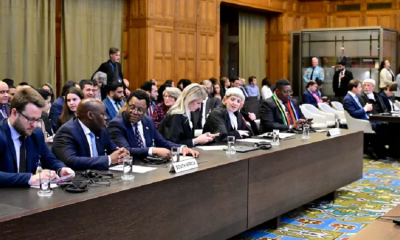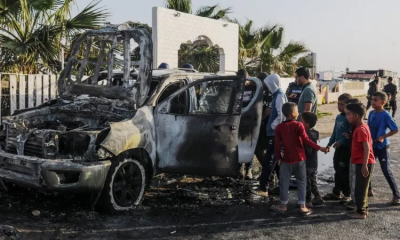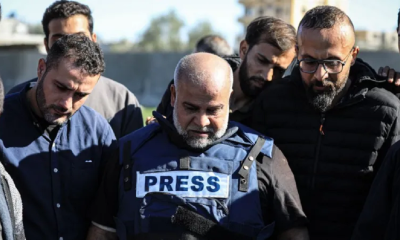Editorial
The continuing onslaught on Gaza

As many as 159 of Sri Lanka’s 225 Members of Parliament have signed a petition expressing support for the besieged Palestinian people, demanding an immediate halt to Israel’s disproportionate response to the atrocity committed by Hamas on October 7. This document, no doubt initiated by the Muslim MPs in the House, was duly delivered to the Palestine Embassy in Colombo with attendant publicity. The chances are there would have been many more signatories on the list had its promoters had the time and the reach to canvass all MPs.
Today’s communications being what it is, most of the world has been privy to dramatic images of the horror that have been unleashed and nobody, but nobody, would want the ongoing carnage to continue for a single second longer.
The support of the United States government to Israel is a given. But the number and size of the protests in the U.S. itself to what is happening in Gaza is an index of public opinion in that country and elsewhere to the ongoing carnage. Such protests are basically fueled by instincts of humanity, inherent in all humans, with other considerations largely ignored by the large mass of the people.
In fact, there was a release, on November 13, by TikTok, of Osama bin Laden’s “Letter to the American People” after the 9/11 terrorist attacks, which was originally translated and published by the Guardian in 2002. This letter, an attempt by bin Laden to justify the killing of nearly 3,000 Americans, went viral after it was posted by TikTok in the US, generating ammunition for many American antisemitic groups protesting the continuing carnage in Gaza.
The text of bin Laden’s letter was immediately withdrawn by the media on the grounds that it would provoke more antisemitic protests. Some TikTok users thought that “despite it being full of antisemitic garbage and Islamic-fundamental nuttery, bin Laden’s letter made some good points critiquing American foreign policy”.
American support for the Israelis after the October 7 attacks was overwhelming. President Biden visited Tel Aviv immediately after the attacks, and was warmly greeted by Prime Minister Netanyahu. Biden’s initial statement indicated complete support for Israel after they had suffered this brutal attack by Hamas.
“As long as the United States stand – and we will stand forever – we will never let you be alone”. He went on to say, “You are a Jewish state, but you are also a democracy. And like the United States, you don’t live by the rules of terrorists. You live by the rule of law. What sets us apart from the terrorists is we believe in the fundamental dignity of every human life – Israeli, Palestinian, Arab, Jew, Muslim, Christian – everyone”.
A typically sanctimonious statement which has not been true in the past, and is certainly not true today.
The Israel Defense Force (IDF) offensive since October 8, with support of the American government, has murdered Palestinian civilians in Gaza, men, women and children, 11,200 and counting, over the past five weeks. They had completely stopped humanitarian assistance to Gaza – water, food, medications, fuel – until last week, when they relented under UN and international pressure. They now allow a barely sufficient number of trucks carrying such aid to Gaza every day.
They have almost complete control of Gaza City, and refuse the ceasefire demanded by the international community. Instead, they have agreed to “Humanitarian Pauses”, a couple of hours respite daily, to enable Palestinian civilians escape to South Gaza with their families and what they can carry in their hands. Where they will be only marginally safer, as the IDF has regular airstrikes in South Gaza also.
And last week, the Israelis committed the ultimate war crime, attacking the Al Shifa hospital, the largest in Gaza City, endangering the lives of doctors, nurses and patients including infants, some in incubators. The IDF stated that they had uncovered, late last Thursday, a tunnel shaft beneath the hospital with weapons, but no independent verification has been made available to date.
A recent nationwide poll released Thursday showed that American sympathy, especially among younger voters, has been sinking during October, with over 50% saying their sympathies were more with the Palestinians.
King Abdullah II of Jordan, a close American ally, acknowledged a pretty reasonable but cynical opinion held by moderate Europeans and Americans: “The message is loud and clear. Palestinian lives matter less that Israeli ones. Our lives matter less than theirs. The application of international law is optional. And human rights have boundaries – they stop at borders, they stop at races, and they stop at religions”.
President Biden had warned Prime Minister Netanyahu, during his visit to Israel soon after October 7, not to make the mistake of getting “consumed by rage” as the Americans did after 9/11. A warning largely ignored by Bibi (as Netanyahu is known), the consummate Israeli hawk, whose one ambition is a one-state solution to the Palestinian problem. The Jewish State of Israel.
International indignation against the continuing carnage by the Israelis is reaching fever-pitch. The feeling is that despite Israeli claims that they target only Hamas terrorists, they are engaging in an all-out assault on the total population of Gaza. As an indication of the intense gravity of this assault, during just the first week after October 7, Israel dropped more than 6,000 bombs on Gaza in one week, nearly as many as the Americans dropped in Afghanistan in a full year.
The reality in Gaza mirrors all the components of genocide according to the statutes of the Geneva Convention. A federal complaint in the US has called for an end to the billions of military support given annually to the Israelis. President Biden has been sued, by the Center for Constitutional Rights (CCR), based in New York, on behalf of Palestine human rights organizations, for “failure to prevent and complicity in the Israeli government’s unfolding genocide”.
Too little, too late. Netanyahu’s ambitions for a one-state solution, with the “elimination” of the Palestinian people, is almost a done deal.
Editorial
Ensure safety of COPF Chairman

Saturday 8th June, 2024
It was with shock and dismay that we received the news about death threats to COPF (Committee on Public Finance) Chairman Dr. Harsha de Silva over the ongoing parliamentary probe into the on-arrival visa scam. Dr. de Silva yesterday told Speaker Mahinda Yapa Abeywardena, in Parliament, that he was facing death threats and intimidation, and it was incumbent upon Parliament to ensure his safety. He stopped short of naming names, but revealed that some ruling party MPs were among those who had ganged up against him. The Speaker only said there had been no complaint, and he would look into the matter.
The SLPP-UNP government has been doing everything in its power to have all parliamentary committees under its thumb. The COPE (Committee on Public Enterprises), which once helped restore public faith in the legislature by exposing state sector corruption, has now become a mere appendage of the incumbent regime, thanks to the appointment of SLPP MP Rohitha Abeygunawardena as its Chairman. The SLPP-UNP combine also tried to oust COPF Chairman Dr. de Silva, but in vain. However, it knows more than one way to shoe a horse.
The COPF, under Dr. de Silva’s chairmanship, has been a thorn in the side of the government, which is struggling to cover up numerous corrupt deals. Dr. de Silva yesterday told Parliament that he found it extremely difficult to function as the COPF head due to severe resource constraints his committee was facing; he himself had to pay the salaries of some of his staff members besides burning the midnight oil.
The sheer workload he had to cope with as the COPF chief had taken its toll on his health, he said, informing the Speaker that he was at the end of his tether, and at times thought of resigning from the COPF. This is exactly what the government wants him to do; resource squeezes and threats are aimed at making him quit.
On 26 May, Dr. de Silva revealed, in an ‘X’ post, that the COPF had uncovered some vital information about the visa scam and it would reveal everything after its final meeting on the issue; the COPF was committed to exposing the truth behind the controversial tender, he added. In an editorial comment on 27 May, we warned him.
While thanking him for his bold stand, we pointed out that by making such a statement, he had thrown caution to the wind, and become a marked target, with the government making an all-out effort to delay the COPF investigation lest the truth should come out much to the detriment of its interests in this election year. Unfortunately, what was feared has come about; Dr. de Silva is complaining of death threats and government moves to strangulate the COPF financially to derail its investigations.
Dr. de Silva’s predicament exemplifies the fate that befalls the few good men and women in Parliament. It is hoped that all those who seek an end to the state sector corruption will rally behind Dr. de Silva, and bring pressure to bear on the government to ensure his safety. Let Dr. de Silva be urged to reveal the names of those who have issued threats, veiled or otherwise, to him and are trying to scuttle the COPF probes.
Editorial
Dead man walking!

Friday 7th June, 2024
The SLPP-UNP government is going hell for leather to make bad laws as if there were no tomorrow. It is abusing its parliamentary majority, which has been retained with the help of some crossovers, for that purpose. The Opposition, the media and trade unions are up in arms, and understandably so. The incumbent regime is a dead man walking; it is so desperate that it is capable of anything. Hence the need for it to be restrained.
The Electricity (Amendment) Bill (EAB) plunged Parliament into turmoil yesterday, but the government secured its passage. The Supreme Court (SC) determined the entire EAB inconsistent with the Constitution and recommended changes thereto. After unveiling the Bill, sometime ago, Minister of Power and Energy Kanchana Wijesekera hailed it as an excellent piece of legislation aimed at straightening up the power sector to serve the public interest better.
The SC determination left him with egg on his face. He reminded us of the proverbial curate who, while eating a stale egg, assured his host, a Bishop, that parts of it were excellent. Wijesekera’s egg, as it were, made Parliament stink yesterday, but he sought to please his masters by praising it as a silver bullet.
EAB should have been discarded and a new one drafted in consultation with all stakeholders. But the government is apparently driven by an ulterior motive; its aim is not to serve Sri Lanka’s interests but to look after those of some moneybags.
It is not uncommon for Bills to contain some flaws, which are rectified either before or during the committee stage. But there is something terribly wrong with draft Bills that are full of sections inconsistent with the Constitution. The drafters of EAB have demonstrated their sheer ignorance of the supreme law, and that they are not equal to the task of drafting Bills. If they had read the Constitution at least perfunctorily, they would not have drafted such a bad law.
Ignorant and incompetent, they do not deserve to be paid with public funds and must be sent back to law school. They must be summoned before Parliament and questioned on their serious lapses, which have caused public faith in the national legislature to diminish.
Curiously, the MPs who demand that judges, doctors, Central Bankers, and other public officials be summoned before Parliament have taken badly drafted Bills for granted. The power sector trade unions yesterday alleged that EAB was of Indian origin and geared towards furthering the interests of Adani Group at the expense of Sri Lanka.
Most critics of EAB are agreeable in principle to the need for power sector reforms; the Ceylon Electricity Board should be given a radical shake-up, and transformed into a modern organisation capable of providing a better service at a lower cost. They only asked the government to tread cautiously, consulting all stakeholders and taking action to ensure that the country’s interests prevailed over everything else. But the government was in a mighty hurry to steamroller the Bill through Parliament, making the Opposition ask whether it was doing so at the behest of some external forces involved in controversial power generation deals here.
What is passed by the current Parliament can be either amended or abolished by a future parliament in a constitutionally prescribed manner. But that does not mean that a government is free to pass bad laws, making the country enter into long-term agreements with powerful nations and their investors. It looks as if the SLPP-UNP regime did not care two hoots about the consequences of its actions.
Editorial
Modi Magic on the wane

Thursday 6th June, 2024
The outcome of India’s parliamentary election (2024) has led to a ‘perspective ambiguity’. Prime Minister Narendra Modi lost no time in declaring victory for the BJP-led NDA alliance, which secured 293 seats in the 543-member Parliament, but he must be a worried man. The BJP is short of 32 seats to form a government under its own steam; it has lost 63 seats or about 20% of its parliamentary strength. It had 303 seats in the previous Parliament, and that number has dropped to 240.
Modi has become the second Indian Prime Minister to win a third term. The first PM to do so was Jawaharlal Nehru. But Nehru won an outright majority in Parliament in 1962; Modi has had to depend on smaller parties in his alliance to retain his hold on power. Modi must be reeling from a sharp drop in his victory margin in his own constituency, Varanasi; it has decreased to 152,000 from 480,000 in 2019 whereas Modi’s bete noire, Rahul Gandhi, won Raebareli by a staggering 390,000 votes.
Modi, who reigned supreme with 303 seats in the previous Parliament, is now dependent on parties such as Nitish Kumar’s JD-U and Chandrababu Naidu’s TDP to form a government. He has had to lead an alliance of strange bedfellows. Both Kumar and Naidu were bitter critics of Modi. Kumar helped form the oppositional alliance, the INDIA bloc, before switching his allegiance to PM Modi. Naidu also closed ranks with the BJP in the run-up to the election. These politicians have been described as extremely ambitious and highly unpredictable, and whether Modi will be able to manage them and consolidate his grip on the NDA alliance remains to be seen. They will demand plum ministerial posts in return for their support. The TDP is said to be eyeing Transport and Health portfolios! That is the name of the game in coalition politics, where it is not uncommon for the tail to wag the dog, so to speak. These two political leaders are however not the only problem Modi will have to contend with. The next five years will feel like an eternity for PM Modi.
Nothing would have been more shocking for the BJP than its defeat in Uttar Pradesh’s Faizabad constituency, where the Ram Mandir has been built. Modi may have thought he would be able to win the Lok Sabha election hands down after the consecration of that temple, which became a centrepiece of the BJP’s election campaign. The BJP lost that seat to the Samajwadi Party! Modi must be disappointed that the Ram Mandir hype failed to trigger a massive wave of support for his party. This particular defeat signifies a massive setback for the BJP’s ethno-religious agenda.
Modi’s divisive election campaign failed to yield the desired result. The BJP’s failure to secure an outright majority could be attributed to a host of factors, some of them being the suppression of the Opposition, the arrogance of power, chronic unemployment, and the rising cost of living. The BJP also did not care to reimage itself in a positive light to attract the youth.
Modi will hereafter see the Congress-led INDIA bloc with 223 seats, in his rearview mirror. The Congress (99 seats) and its allies have eaten into the BJP support base considerably, but they have a long way to go before being able to capture power.
The bumpy ride ahead for the BJP-led coalition government to be formed may improve the INDIA bloc’s chances of bettering their electoral performance and turning the tables on the BJP and its allies in time to come. Modi will have a lot to worry about in his third term.
























